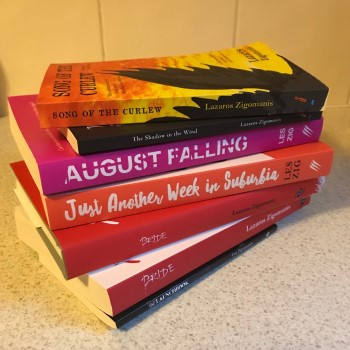One Word
The  thought of sending a book out into the world is – if you think about it seriously – daunting. Who knows if people will like it? If they don’t, what are the greater implications? Can you continue to build your writing career? Are you set back so far that it’s beyond repair? How does any of this affect your confidence? The blazing success stories are few compared to the amount of books published that sell only moderately, or underperform.
thought of sending a book out into the world is – if you think about it seriously – daunting. Who knows if people will like it? If they don’t, what are the greater implications? Can you continue to build your writing career? Are you set back so far that it’s beyond repair? How does any of this affect your confidence? The blazing success stories are few compared to the amount of books published that sell only moderately, or underperform.
But step that back: just submitting a book to a publisher can be intimidating. Oh, you might brim with mindless enthusiasm before you know better, but then the rejections come. Then they mount. Then you’ve exhausted all the publishers in the country. Self-publishing is becoming more and more a viable alternative, but you need to find the right people. There are predators out there. What the hell do you do?
The thought of writing a novel can be crippling – that’s about 80,000 words, building a plot, juggling subplots, developing layered characters and believable motivations, and somehow intertwining this into a cohesive, engaging, appealing narrative. It’s like trying to weave a complex tapestry with a toothpick.
You can break down those writing fears further: a book’s made up of sections, chapters, sub-chapters, acts, paragraphs, sentences, and then words. Each can be examined, dissected, investigated, and then queried as to its worth and functionality and (for the want of a better word) rightness, because that’s what writing’s about: finding the right word to do the job required. If you do, hooray. Stumble onto the next. If you don’t, you diminish your whole work.
Writing is the one vocation where experience doesn’t necessarily equal confidence. In sports the more you play, the better you become – not just physically, but psychologically. I’ve worked in design and find it not only easier to layout a book now than I did three years ago, but easier to find solutions when problems present themselves. I’m betting surgeons grow surer with each surgery. It’s a common theme vocationally. You get better the more you do something.
But writing?
I handwrote a fantasy novel when I was fifteen. I typed it up (on a typewriter) when I was eighteen. I rewrote it (on a PC) when I was nineteen. I had false starts and restarts, but it was always easy for me to sit down and just write. I never questioned it. I wrote another fantasy epic when I was twenty-one. Again, I would just sit there each night without hesitation and just write. I didn’t know any better. So I wrote.
But as I’ve grown more knowledgeable and more experienced, I’ve learned what can be wrong with my writing. Then the questioning comes. No two books are ever the same, even though they share the same ingredients (structure, plot, characters, etc.) so can never develop that unquestioning confidence. You can be confident you’ll finish a book – I know that if I start something, I’ll finish that. I’ve taught myself that as a discipline over the years. I just don’t know if it’ll be good. If it’ll work. And, even if gets past one hurdle, whether it won’t fall at the next.
Lately, I’ve questioned my writing more and more, finding myself often stricken with the fear that whatever well supplies my words may run empty, and I’ll sit there, mid-sentence, with absolutely no idea what word comes next. And when that next word comes, I’m temporarily assured, until I have to think about the next word. And then the one after that. All it’ll take is one domino missing from the chain and from that point on nothing happens.
Writing is not as easy as people think.
If I had to use one word to sum it up, that word would be
